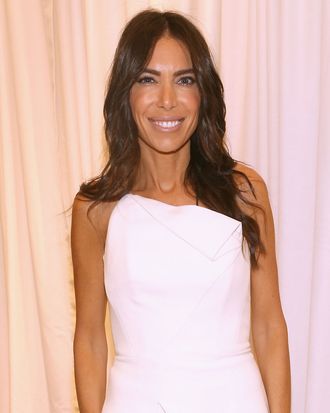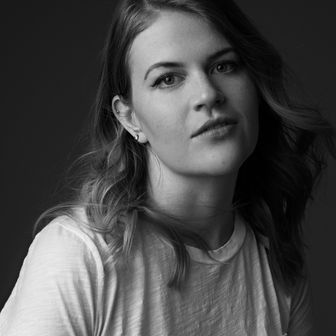
For the past few weeks, stories have been popping up about the alleged dangers of the F-Factor diet, a popular, high-fiber diet plan developed by prominent dietitian Tanya Zuckerbrot. Several articles detailed claims shared by Emily Gellis Lande, a fashion and lifestyle influencer who has spent much of the summer posting hundreds of screenshots on Instagram of the messages she’s received from people sharing the dangerous side effects they say they experienced while on the F-Factor diet. In the messages, which Gellis shares anonymously, people say they suffered from hives and rashes, migraines, canker sores, and severe gastrointestinal distress, including constipation and rectal bleeding.
The outcry has raised questions about the safety of the popular diet, which counts among its devotees celebrities like Megyn Kelly and Katie Couric. According to a new report from the New York Times, though, the story also has a bizarre twist: Of the hundreds of anonymous claims made about the plan, one of the most dramatic — that the F-Factor and its products caused a person to miscarry — was a hoax, planted to undermine the other legitimate stories.
So, what is the F-Factor diet, exactly? Is it safe? And who planted the fake message and why?
How does the F-Factor work?
The F-Factor diet was developed over 20 years by New York dietitian Tanya Zuckerbrot. On its website, the F-Factor boasts that it is the “most liberating approach to weight loss and optimal health,” saying that its four “disruptive principles” — eat carbs; dine out; drink alcohol; work out less — make it “liberating” and “sustainable.”
The focus of the F-Factor diet is fiber. In step one, according to Good Housekeeping, dieters are supposed to eat 35 grams of fiber a day, and less than 35 grams of net carbs. In steps two and three, they’re still supposed to aim for 35 grams of fiber per day, but are allowed to up the number of carbs they eat.
While the F-Factor website says dieters are not required to cut or count calories, it claims that “there is an inherent calorie-cap built into the program,” because by eating so much fiber, people will feel fuller and eat less. To help them hit their daily fiber goals, dieters are encouraged to buy products from F-Factor’s line of fiber/protein bars and powders.
According to Dr. Tom Hildebrandt, the chief of the Center of Excellence in Eating and Weight Disorders at the Icahn School of Medicine at Mount Sinai, health professionals have had concerns about the F-Factor for years. He told the Times that the patients his office sees are “particularly vulnerable to diets with highly branded promises” — like F-Factor’s — and that the plan’s messaging is concerning “when you match it with a diet like this one that requires you to eat very little nutrition and to approach food in a very regimented, controlled way.”
In response to Dr. Hildebrandt’s concern, Zuckerbrot told the Times: “Why hasn’t he reached out to me and said, ‘Tanya, your program is harming people? If he has such altruistic motivations, why hasn’t he reached out to me?” She also pointed out that several doctors have praised her plan on the back cover of her book.
Who is Emily Gellis Lande, and how did she get involved?
Gellis, 34 — a fashion and lifestyle influencer with over 173,000 followers on Instagram — had never done the F-Factor diet, but had heard of it through the grape vine over the years. “It was certainly a very popular diet in NYC,” she told the Cut in an email.
Then, in mid-April, she says she saw an anonymous tip on Instagram that said that Zuckerbrot had suggested to a private client of hers that they stop taking antidepressants if the antidepressants caused weight gain. (Zuckerbrot vehemently denied this claim in the Times, saying that it was a “lie,” and that “this never happened and it never would happen.”)
After seeing the post, Gellis responded with a video on Instagram in which she emphasized the importance of mental health and doctor-prescribed antidepressants. Soon after, Gellis began noticing and sharing more messages on her Instagram Stories about people’s experiences with the F-Factor, and more and more people began to reach out. Some of the allegations — including one from a woman who said the F-Factor’s products caused her to miscarry — were picked up by outlets like the New York Post and Refinery29.
“This story started because I simply became a vehicle for women to share their stories,” Gellis told the Cut.
While Gellis says that her in-box has been flooded with positive messages from people thanking her for sharing their stories, she says she has been met with “intense cyberbullying” as well. “This is a common theme in F-Factor’s playbook,” she says, and is why she grants anonymity to people sharing their stories.
What side effects do people say they’re experiencing?
Gellis says the most common complaints she sees are body and armpit rashes, migraines, hives, severe gastrointestinal distress, panic attacks, and heavy metal poisoning. “One girl sadly has had part of her colon removed,” Gellis claims.
While the vast majority of the stories Gellis shares are anonymized and unverified, the Times spoke to some of the women who shared their experiences and fact-checked their claims. One said she went on the diet when she was 32, and “within a month developed abdominal pain so severe that she went to the doctor and to the emergency room and underwent two CT scans.” Another said that after eight months of drinking shakes mixed with the F-Factor fiber/protein powder, she developed “excruciating red spots that required a biopsy.”
Zuckerbrot maintains that her diet and products are safe. She told the Times that her company has received over 176,000 purchase orders for its powders and bars since they were introduced two years ago, and that in that time, they’ve only received 50 complaints about gastric distress or rashes.
Gellis, meanwhile, has asked that Zuckerbrot release a certificate of analysis from a third-party lab confirming that the F-Factor products do not contain contaminants like pesticides or dangerous levels of heavy metals. While Zuckerbrot initially declined to release the document, claiming it contained proprietary information, she told the Times that she would share it in the coming days, explaining, “Because of all the misinformation and accusations of high levels of lead, our true customers are now concerned.”
Okay, so … what’s this about a planted story?
One of the biggest curveballs in all of this relates to two messages Gellis received from women saying that the F-Factor diet and products had caused them to miscarry. These allegations were cited in multiple news stories, but one of the claims, the Times found, was a hoax (The Cut was unable to verify the other).
In an email to Zuckerbrot and Eva Chen, the director of fashion partnerships at Instagram, Alison Brettschneider, 44, a former Instagram influencer, said that she made up the miscarriage story and that “it is a FULL OUT LIE. I have never used Tanya’s products.”
Brettschneider, who emailed Chen and Zuckerbrot from the account crazycancelculture@gmail.com, told the Times that she, too, had once been the target of criticism on Instagram back in the summer of 2018, after the academic and activist Rachel Cargle posted about the killing of a young Black woman, Nia Wilson, at a BART station in Oakland, California, writing: “I’m waiting for your fave white feminists to post about #NiaWilson.” While some white feminists responded to Cargle’s call, pledging to take action, Brettschneider, who ran the popular Instagram page @25Park, became defensive. In messages later shared by Cargle on Instagram, Brettschneider called Cargle “shameful” and a “clown,” accusing her of alienating women. She also threatened Cargle’s followers, and according to some, reached out to their employers to complain about them. Her Instagram account was subsequently suspended for bullying, and she is now suing Instagram.
Brettschneider told the Times that she planted the false miscarriage story because she couldn’t stand silently by and watch Zuckerbrot be “attacked” by people on Instagram. Oh, and Brettschneider’s cousin, Amanda Karp, is F-Factor’s head dietitian, but I’m sure that’s just a coincidence.
This article has been updated to clarify that the Cut did not verify a second claim that the F Factor had caused miscarriage.





